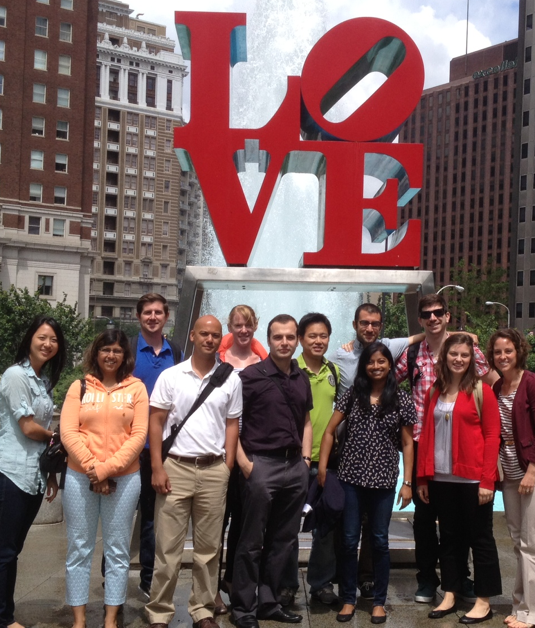After a half-decade of gaining a reputation in social enterprise without the money to back it, GoodCompany Group will announce today $500,000 in committed capital from Investors Circle Philadelphia. That means if you’re one of a dozen startups chosen for the social entrepreneurship summer training program this year, you have a new pile of investment money set aside just for you.
Applications for the first GoodCompany social entrepreneurship accelerator class to have guaranteed money behind it open today. Apply here.
Formed a year ago by a merger between GoodCompany Ventures and GreenVillage, the three-months-long Center City business boot camp for mission-minded for-profit startups has a good reputation for rigor, mentorship and connecting. But ask entrepreneurs who finished the program for criticism and they have often had a common refrain: where’s the money?
That is, good ideas to solve big problems with a profit model in mind have gone through the program and then fizzled or left for traditional risk-tolerant capital markets. This $500,000 is meant to be a sign that that’s changing.
To be fair, real investment has come out of GoodCompany classes before, much of it from angel investors sitting in the audience at the accelerator’s annual demo day. (Read about last year’s here). In fact, Investors’ Circle has invested in at least one startup during each of the GoodCompany classes, including PublicStuff, Black Gold Biofuel and ElectNext, said GoodCompany Executive Director Zoe Selzer, and boasts dropping $1 million in local social enterprise efforts in the last two years.
The difference though, says John Moore, the local Investors’ Circle president, is that by committing $500,000 ahead of time, GoodCompany will likely attract an even stronger pool of candidates and help them stay.
Where GoodCompany graduate ElectNext is now straddling three markets — New York, San Francisco and Philly — as it seeks additional capital, talent and partnership, some additional mission-minded money could help keep a team like that rooted here longer, goes the thinking from GoodCompany co-founder Garrett Melby and Moore.
Is $500,000 a lot of money for investment?
By traditional standards no. Even the city’s Startup PHL effort to match a venture capital firm to create a $6 million local investment fund was called by some as more symbolic than transformative. But Melby counters that the social enterprise space is still capital-resistant enough that half a million means something.
“There is not a lot of depth in the impact investment space,” he said. “This guaranteed money helps make us one of the best funded [social impact] accelerators around.”
So after spending the summer going through the program, the year’s class of ventures that are most ready and willing to chase outside investment to bring their effort to scale will have the inside track on house money.
“Our members are committing this money ahead of time, rather than waiting until the fall and deciding to open up their checkbooks, because we’ve seen the quality come out of GoodCompany in the past,” Moore said.
This new GoodCompany class will have another distinction to boot.
Organizers will be giving special preference to startup applicants that are attempting to address urban problems, as GoodCompany will begin “bending its work” toward the planned Philadelphia Social Enterprise Partnership that has won $1 million in funding from the Bloomberg Philanthropies, said Melby.
How GoodCompany’s accelerator will fit into PSEP is not quite determined, said Selzer, as winning the grant will only now kick start the detailed discussion between partners, which include the city, about what full implementation looks like.
“This isn’t a million dollar project,” said Selzer. “This is a million dollar catalyst.”
This forthcoming GoodCompany class, with money on the table, will help shape how Philadelphia can continue to become a hub for social entrepreneurship because money has always been a priority, said Melby.
“Applicants will know that there is money available for social impact here in Philadelphia,” said Melby. “That’s even more reason to come and more reason to stay.”
Investment is not guaranteed, nor is it required for those who are accepted to GoodCompany. Like in the past, the class will likely include 10-12 startups, and, unlike other accelerators, particpating companies still will not have to give up a portion of company equity for the shot to attend. That’s a separate conversation that will be tied to the investment.
“That way we can serve the companies first and then talk about investment later,” said Melby. “That’s how we can focus on value, rather than be a specific investment vehicle.”
But the hope here is to create a pipeline, said Moore. The goal is syndication, in which Investors’ Circle can follow its model of sharing its deal flow with its national partners and helping with a Series A round or others for the right startup. Get funded out of that $500,000 pile and be more likely to get more later if it’s to grow the proverbial startup pie.
Why does Moore have the personal interest here?
His day job at RobinHood Ventures keeps him in a traditional investment role, and he often writes checks to charities he believes in.
“This is somewhere in the middle,” he said. “But a lot more fun.”
And as any investor will tell you, developing a regional distinction that attracts and retains startup talent is a chance to make more money and fund the cycle over again.
“We want to create proprietary deal flow of social enterprise work in Philadelphia, to become a center of social entrepreneurship,” said Moore.
What’s next to make that happen?
“This is a big step from the investment community and PSEP shows a big commitment from the Nutter administration,” said Melby. “To make this social entrepreneurship hub in Philly conversation to be real, we need more of the private sector to step up and our big institutions. We need to think about tying the ecosystem together.”







